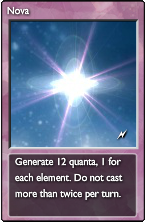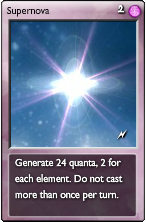Nova
|
|
Contents
Overview
When it comes to pure quanta generation, Nova (and its upped counterpart, Supernova) is unrivaled. Upon casting the spell, the player will generate 12 (or 24 upgraded) quanta evenly distributed between all elements (1 or 2 per element). While the amount may seem small, its resourcefulness has made it one of the most impressive cards to use in many decks.
General Use
Quick Facts:
- Instantly provides 1 quanta (2 quanta if upped) per element, resulting in a net worth of 12 (24 upped) quanta.
- Nova doesn’t require a cost; Supernova requires 2
 to use, but replenishes the drained quanta immediately.
to use, but replenishes the drained quanta immediately. - Generates a Singularity if cast multiple times (Nova must be cast 3 times to trigger this, Supernova only twice).
Nova is notorious for its ability to mass-produce quanta quickly and efficiently. Unupgraded, Nova is completely free (and acts as a one-time tower for each element), meaning it has a higher chance of being placed in your starting hand due to the Mulligan rule. While it only generates 1 quantum for each element (12 total), its speed and simple mechanic can surprisingly fuel several cheap cards given the right deck setups. For the upped version, Supernova, its cost is raised to 2 ![]() unfortunately, but also provides 24 quanta (2 quanta for each element). In other words, casting Supernova will essentially refund the player’s quanta, while also conjuring the other 11 types of elemental quanta for them to spend.
unfortunately, but also provides 24 quanta (2 quanta for each element). In other words, casting Supernova will essentially refund the player’s quanta, while also conjuring the other 11 types of elemental quanta for them to spend.
Many decks often use Nova and Supernova in various trio, quartet, and rainbow decks that have multiple elements in them, especially ones that have cheap cards that require a small splash of quanta from other elements to use Other cards or non-element-specific cards to play. The forum has a compilation of Supernova Speed Rainbow decks, which utilizes the upgraded version of Nova. It can be accessed here.
In addition to all of this, Nova can be a great way to deter quanta denial cards. Pest might not absorb the most vital quanta (say, that of a player’s mark), if that person is running a duo, while a Discord can actually scramble the various elemental quanta into the Nova-user’s favor. And Quicksand (which destroys the general source of quanta-production, pillars) can’t touch Nova at all. Conversely, a single Black Hole can absorb all of the quanta generated by either card, so players should beware of signs that the enemy might have the alchemy spell.
As a detriment for those who enjoy spamming the spells to rack up quanta, there lies the effect of creating a Singularity on the field if a player casts Nova three times in the same turn, or Supernova twice. Singularities are annoying creatures that will often help the opponent by granting them quanta or health while also damaging the owner, and thus should either be killed as quickly as possible or removed from play to avoid being swarmed by them. Nova can be safely played twice before this 'risk' comes into play, while Supernova can only be played once per turn to avoid them from being generated. Also, using three Nova or two Supernova in the same turn while you have no more creature slots available still grants you the quanta, but the Nova|Supernova will stay there, however, in actuality, it has transformed into a Singularity in your hand.
Synergies
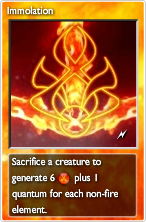 In terms of fast-quanta generation techniques, Immolation | Cremation combined with Nova can provide one of the fastest ways to produce various high-attack creations on the field. A single Immolation is equivalent to a Nova’s mechanic (with more
In terms of fast-quanta generation techniques, Immolation | Cremation combined with Nova can provide one of the fastest ways to produce various high-attack creations on the field. A single Immolation is equivalent to a Nova’s mechanic (with more ![]() quanta produced), given a sacrificed creature in return. In many rainbow speed-based decks, the combination of these two spells will often allow a person to play all (or most) of their cards in their starting hand on the first turn, resulting in a high-offensive front being laid out.
quanta produced), given a sacrificed creature in return. In many rainbow speed-based decks, the combination of these two spells will often allow a person to play all (or most) of their cards in their starting hand on the first turn, resulting in a high-offensive front being laid out.
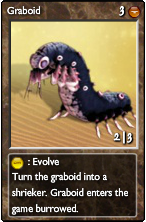 Graboid | Elite Graboid can surprisingly work well with Nova. Graboid is cheap and immune to target-based CC (as it enters the field burrowed). Costing only 3
Graboid | Elite Graboid can surprisingly work well with Nova. Graboid is cheap and immune to target-based CC (as it enters the field burrowed). Costing only 3 ![]() to play onto the field, the Graboid's real trick is its ability. As Graboid requires 1
to play onto the field, the Graboid's real trick is its ability. As Graboid requires 1 ![]() in order to use its Evolve ability, multiple Novas alongside a player’s Earth mark will generate the required quanta to pop out the Shrieker in time. Again, this tactic is another fast and easy offense, but given other cheap non-earth cards, one could essentially mix several Graboid and Novas in a deck with other cards in order to create a powerful and versatile deck in non-upped PvP formats.
in order to use its Evolve ability, multiple Novas alongside a player’s Earth mark will generate the required quanta to pop out the Shrieker in time. Again, this tactic is another fast and easy offense, but given other cheap non-earth cards, one could essentially mix several Graboid and Novas in a deck with other cards in order to create a powerful and versatile deck in non-upped PvP formats.
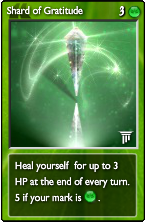 Although rare, Shard of Gratitude | Shard of Gratitude (SoG) is an effective card to use alongside Supernova (and its non-upped version in some cases). As an Other card, SoG uses 3 generic quanta to play, meaning that quanta from any element pool can be taken for the Shard to land. False Gods can often deal severe damage if a player lacks healing or defenses at start, but a single SoG can heal 3 damage per turn (5 if the player is using
Although rare, Shard of Gratitude | Shard of Gratitude (SoG) is an effective card to use alongside Supernova (and its non-upped version in some cases). As an Other card, SoG uses 3 generic quanta to play, meaning that quanta from any element pool can be taken for the Shard to land. False Gods can often deal severe damage if a player lacks healing or defenses at start, but a single SoG can heal 3 damage per turn (5 if the player is using ![]() mark), which quickly adds up over the course of a game. Multiple SoGs on the field can be hard to pull off in regular mono and duo decks given the limited quanta sources, but a Rainbow that includes several Supernovas at the start will oftentimes lend players a hand into placing the SoG permanent as quickly as possible.
mark), which quickly adds up over the course of a game. Multiple SoGs on the field can be hard to pull off in regular mono and duo decks given the limited quanta sources, but a Rainbow that includes several Supernovas at the start will oftentimes lend players a hand into placing the SoG permanent as quickly as possible.
Other Cards With Synergy
It’s important to note that almost any card can work in conjunction with Nova and Supernova, assuming that the right sources of quanta production are in place. That said, cheap cards that splash multiple elements such as Sundial, Werewolf, Forest Spectre, and Physalia can hit the field first and use their abilities the following turn.
When it comes down to dirt-cheap cards, Arsenic and Vampire Dagger are the most preferred weapons to use with Nova, although the non-elemental weapons and Discord can be played quickly as well. Improved Fog, Precognition, Momentum, Congeal, Protect Artifact, and Explosion have cheap quanta cost, and can be easily inserted in any deck to counter a variety of situations.
Conclusion
No matter the deck archetype, Nova has almost become synonymous with the term ‘Rainbow’ when it comes to deck designing. While the spell might not be as useful for every deck, its versatility and cost-effective ratios are truly noteworthy, and should be expected when fighting many professional players.
Popular Deck
Tha gold league killer

6qq 6qq 6qq 6qq 6qq 6u3 6u3 6u3 6u3 6u3 6u3 6u5 6u5 713 713 74f 74f 77g 77g 7ah 7dm 7dq 7gv 7ju 7n8 7n8 7q5 7t9 7t9 80b 8pj
